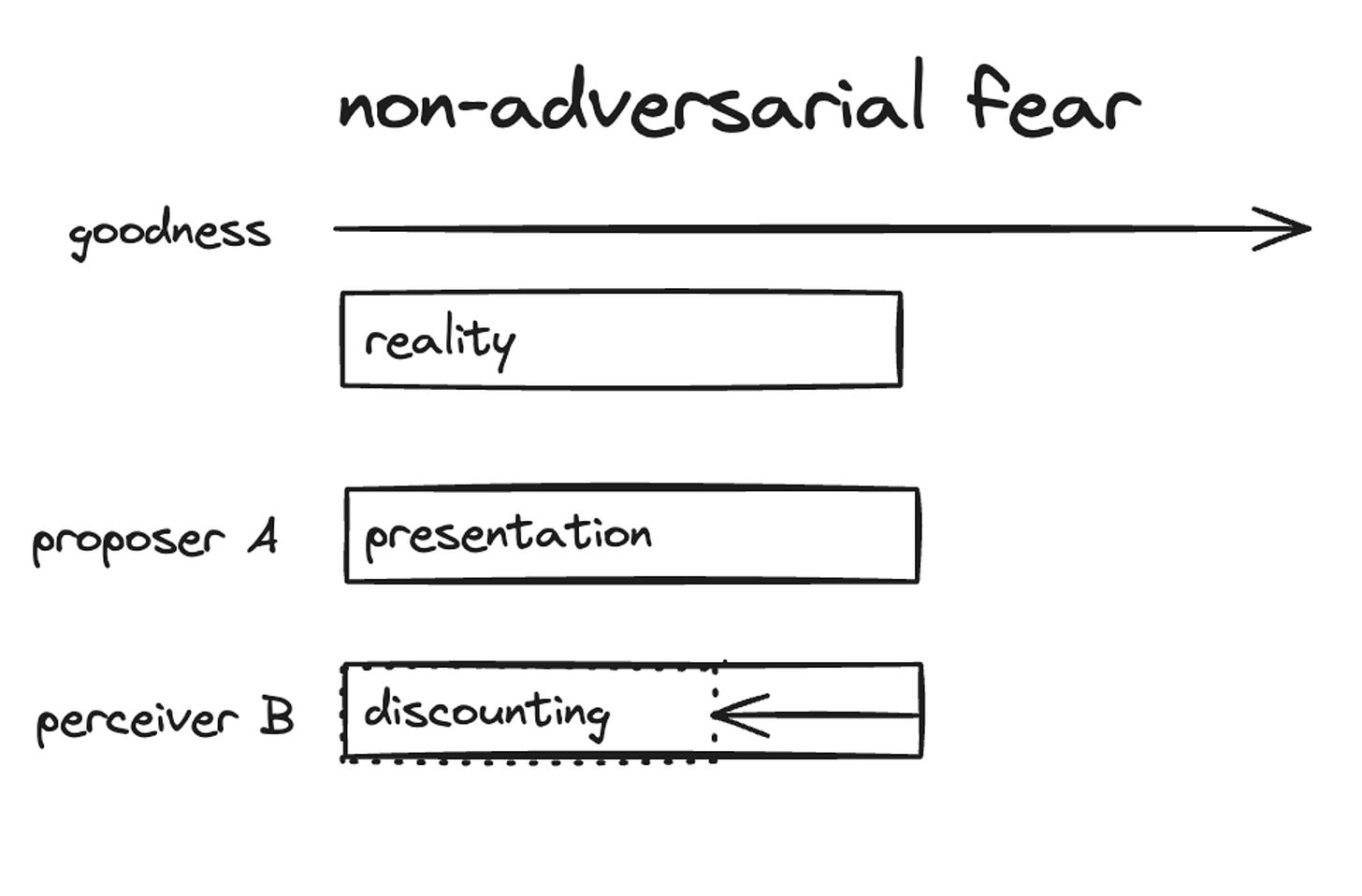adversarial conversations suck
information transparency makes my blood pressure go down
<aside> ⚠️ adversarial conversations are not the same as “confrontational“ or “aggressive”. i define adversarial as the opposite of collaborative [most of my conversations i am to be confrontational collaborative]
</aside>
the purpose of this article is to illustrate what I mean when I say I don’t like liars or i care about substance or i hate playing information games. it’s also meant to convince you i’m right - and hopefully the volume of adversarial conversations i have
skeleton:
what are adversarial conversations?
why are they reinforced…
why break out of this paradigm?
how i navigate
how to work with me
what are adversarial conversations
adversarial conversations are conversations where both parties try to lie to the other party w/ by extracting information while giving up little of their own. it’s a version of the prisoner’s dilemma… but both parties are choosing defect. example adversarial conversations include:
salary negotiation (employee wants to get paid more, get an offer, present better, employer wants to pay less and identify frauds)
software evaluation (salesperson wants to present better, close deal, and charge more; buyer wants to pay less and identify frauds)
vc pitch (founder wants to raise more, close deal, create hype, vc wants to pay less, and identify frauds)
dating (both parties are trying to make themselves desirable while trying to identify undesirable dealbreakers in counterparty)
*the dynamics could be flipped too; maybe the employer might be pitching a hire, a vc might be pitching a founder, a buyer might be pitching a seller… but there’s an proposer A and perceiver B
adversarial patterns emerge when both parties lack trust - resulting in second guessing. it results in decisions that are suboptimal for both sides, bad blood, and often favor the actor who’s simply a more aggressive communicator.
we’ve all been guilty of it to some degree - we get fired, and when asked “what happened” we lie through our teeth and say “oh i thought it was ready for another thing“. “ We’re insecure about the job offer we’re giving… so when the prospect asks how much stock… the founder lies and says a share count… FMV… or a percentage… without telling them what the dilution and pref stack is.
it’s obvious why this sucks. every party spends energy trying to find the truth, and instead of starting from the truth and working to find the best path forward
why are they reinforced…
given that the typical proposer A will exaggerate reality, the perceiver b is tuned to discount by some rate in the adversarial conversation. a good faith proposer A is afraid that if they don’t exaggerate in their presentation, the discounting from perceiver B will result in them being perceived as much worse than they are…
why break out of this paradigm?
it might feel unavoidable, but if you frame it correctly the true incentives should be aligned. adversarial interactions start w/ two parties trying to create a larger pie - and then disagreeing with how to split the pie.
<aside> 🚧 this is really bad - spending mental cycles on the adversity favors no one overall and reduces the size of the pie. the cost is in damaged trust and waste time
</aside>
for salary negotiations — you both want the work because together you theoretically create more value
the employer should want to pay in line with what the value the employee creates… bc below that they’re a taking advantage of the talent [and will lose them]
the employee should want to be paid in line with what they produce… bc, above that they’re a parasite [and will get fired]
the conversation should be framed around “ok let’s figure out how much value X you can create working here, and is the portion of value X we can afford to pay you is worth your time…”
if another company can give a better offer, it should be because “you can create more value Y at company B, Y > X, so company B can pay you more.”
for venture investments — you both want the deal bc you think that the capital provided and partnership created can create more value than the next best offer
the investor should want to invest in line with the company’s value… bc too low and they’ll be taking advantage of the founder
the founder should want to take investments in line w/ value… bc too high and their team won’t be able to capture their fair contribution
the conversation should be framed around “ok let’s figure out, warts and all, exactly what the value of the company is w/o needing to sell FOMO”
if another vc can give a better offer, it should be because “they can provide more value to the founder, not because the founder presented more FOMO to them.”
this means spending less time playing the narrative game and presenting yourself as is, warts and all in all situations. this risks the other party discounting everything you say past the reality.
how i navigate
adversarial conversations are built on a lack of trust. it makes me feel bad to begin a working relationship with someone through a conversation that lacks trust. the belief that helps me navigate this is the willingness to walk away at all times.
if you’re willing to walk away, then cost of being defected on is low [if i can tell]. i would sooner walk away than work with someone who operates adversarially. i need a very effective “bullshit detector”.
i preface most conversations with some opening to the effect of “btw this is not a negotiation, like here are 3-5 reasons you shouldn’t work with me… if any of them are dealbreakers, we should call it a day.” if you want to know what i generally mean, read [link to this current article]
this is my initiation of the “cooperation” state. it's my counter-signaling that i won’t engage in bragging or exaggeration. that it comes with several reasons not to work with me (and not platitudes, but real reasons like… i’m super aggressive and confrontational, and that’s not for everyone) usually puts the other party at ease, knowing they won’t need to think about fact vs. fiction w/ me.
then comes the bullshit detector. Despite signaling that i communicate cooperatively, some people will continue exaggerating their achievements.
i say “i think you’re lying”. i ask for details. i ask for number and degrees. i make it as uncomfortable as possible for someone to exaggerate… (I’ll write a thing about my minimum bar for integrity at some point, but as you can imagine — it’s pretty high) and if a sufficiently good liar takes me for a ringer in a single conversation, congratulations. they’ve tricked me effectively.
but over a long enough time horizon, all exaggerations start to show cracks. given that I’m several standard deviations above the norm in confrontationalness, I feel confident I can catch duplicitousness quickly.
and if i find out someone is exaggerating things, i try to excise them from my surroundings. i let them know i know they’re a grifter. i let everyone around us know they’re a grifter.
for me, if i’m going to opt out of the nash equilibrium of adversarial game defection and cooperation - i do not request cooperation. i demand it. it hurts me greatly when someone else exaggerates or defects in my cooperation. if i find out someone is defecting… i would rather come down on them hard… forever. relentlessly and irrationally eliminate humans like that from the circles i frequent.
how to work with me
let’s roll through an example of how every single one of our hiring processes go.
our first conversation, i give them a dozen reasons why we’re an awful place to work and why they shouldn’t work here.
if we give them the work trial, we’re clear that 85% of people have failed this step, and if they can’t work as fast as everyone else, they wouldn’t enjoy working here anyway. we share our comp bands and who’s on what band, and what each band implies
we tell them what bucket of performance they’re in compared to the rest of the team. there’s no space for “i want to get paid more” and no space for me to ask them for their number… our numbers come from a fixed principle around what the value at a certain performance tier is for us.
there are only two evaluations, and the evaluations are transparent and discrete.
which bucket of performance, if any, can you measure up to [l3 / l4 / l5 / l6]
compare to the others in the bucket, know that if you are over-leveled, people will call that out, and if you’re under-leveled, you should call that out
do we let you create enough value at that level here for you to want to work here by capturing just under that?
there’s no secondary consideration about matching offers, etc. if you can capture more elsewhere, that means you
can create more value elsewhere [in which you should go]
are capturing more value than you can create [and we wouldn’t want to hire you]
given that everything is fixed and transparent, it’s incredibly difficult to fake anyone’s competency. and it makes every conversation incredibly liberating and not tense.




